New formulation of FDA-approved drug may help treat Niemann-Pick Type C disease
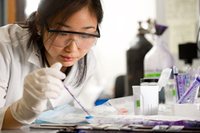
Niemann-Pick Type C (NPC) disease is a rare, fatal neurodegenerative disease for which there is currently no cure. NPC primarily strikes children before and during adolescence and affects one in every 150,000 children. Researchers Kasturi Haldar, the Nieuwland Professor in the Department of Biological Sciences and the Parsons-Quinn Director of the Boler-Parseghian Center for Rare and Neglected Diseases in the College of Science, and Dr. Suhail Alam and Michelle Getz in the Center for Rare and Neglected Diseases used existing FDA-approved drugs in a novel approach to treatment with promising results.
Fr. Hesburgh's impact on UNDERC
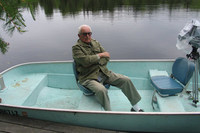
During the one year anniversary of the death of Fr. Hesburgh, the College of Science recalls and appreciates the impact that he had on science at Notre Dame. Notre Dame’s nearly 8,000-acre Land O’Lakes property in Wisconsin, originating with a 1,000-acre gift from philanthropist Martin J. Gillen in the 1930s and vastly expanded by Father Hesburgh, has been the site of high-impact gatherings hosted by Hesburgh. In 1959, a group of Northern and Southern political leaders who happened to be fishermen hammered out an agreement that became the basis of the Civil Rights Act; in 1967, a global collection of top educators issued the Land O’ Lakes Statement on Catholic higher education in America.
New avenues found for treatment of pathogen behind diseases including fasciitis, toxic shock syndrome
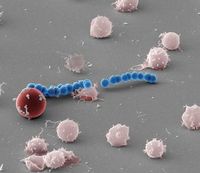
One bacterial pathogen is responsible for a range of diseases, from pharyngitis and impetigo to more severe diagnoses such as toxic shock syndrome and necrotizing fasciitis (flesh eating disease), a serious bacterial skin infection that spreads quickly and kills the body’s soft tissue. The pathogen, known as Group A Streptococcus, remains a global health burden with an estimated 700 million cases reported annually, and more than half a million deaths due to severe infections.
Haiti: Notre Dame’s fight to end Lymphatic Filariasis
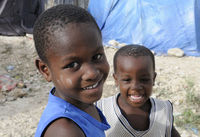
It’s a little more than an hour by car from the village of Léogâne to the Port-au-Prince office of Dr. Joseline Marhone, Haiti’s director of food and nutrition in the Ministry of Public Health…
Collecting DNA by spider web - ND alumnus publishes undergrad research
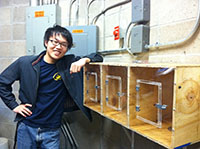
"The summer after my freshman year, I remember I was processing deer mice in an old garage in Nebraska where I was assisting with field work during my internship at Harvard University," said Xu. "I looked around and saw there were spider webs clinging everywhere. After a year of working with eDNA in Dr. Lodge’s lab at Notre Dame, I thought to myself, 'If you can find DNA of fish in the water it's swimming in, there has to be DNA of spiders and maybe even their dinner on spider webs.'"
Using mathematical models to fight the Zika virus
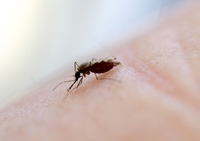
New research from the University of Notre Dame will be used to generate maps that provide time-sensitive, mosquito-to-human ratios that determine patterns of mosquito population dynamics for the Zika virus. The model outputs will be available online to provide users with the ability to find reported cases and estimated incidences by location of the virus to improve disease transmission and prevalence forecasts, which is critical to making accurate predictions and translating results into effective public health strategies.
Scientists detect wasps evolving into new species
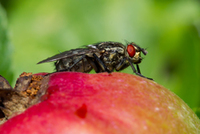
Scientists have observed three species of wasps evolving into three new species, an intriguing case of rapid evolution in action. Understanding how new species form, a process termed “speciation,” is a central question in biology. Scientists typically study speciation with respect to how populations of a single species diverge to form two distinct species.
ND-LEEF pavilion receives award from Indiana AIA
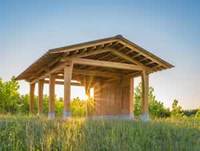
The Morrison Family Education and Outreach Pavilion received a 2015 Citation Award from the American Institute of Architects (AIA) Indiana. Constructed in October 2014, the pavilion marks the inaugural building at Notre Dame’s Linked Experimental Ecosystem Facility (ND-LEEF), and the first University structure to receive a commendation from AIA Indiana Design Awards. The Morrison Pavilion was recognized in AIA’s new construction category for projects costing less than $1 million. The four-member AIA Jury commented on the pavilion: “We were impressed with every detail and choice made in the design of this structure. The decision to orient the building along the summer solstice, and to situate it with its back to the approach, a simple swath of mown meadow, was poetic.”
Environment of tumors impacts metastasis, study finds

If a tumor is like a seed, the soil around it plays a significant role in its growth, a new study finds. According to the study’s results, the microenvironment of a tumor cell has significant impact on cancer metastasis. This discovery by Siyuan Zhang at Notre Dame and a team at the University of Texas MD Anderson Cancer Center has focused attention on fighting cancer in the tumor cell’s microenvironment.
Mosquitos capable of carrying Zika virus found in Washington, D.C.
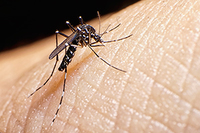
On Monday (Jan. 25), the World Health Organization announced that Zika virus, a mosquito-borne illness that in the past year has swept quickly throughout equatorial countries, is expected to spread across the Americas and into the United States.
Breast cancer researcher studies antioxidant connection

When it comes to fighting cancer, the enemy of our enemy could be our friend, according to a University of Notre Dame researcher. As studies continue to suggest antioxidants could actually help cancer cells grow, the research of Zachary Schafer, the Coleman Foundation Associate Professor of Cancer Biology, can help explain why.
Senior Mark Brahier explores barriers to healthcare in Nicaragua

Mark Brahier, a senior biological sciences major and international development studies minor, spent five weeks in Nicaragua this summer. Traveling with International Samaritan on his fourth trip to Central America, Brahier set out to study social, political, economic, and geographic barriers to healthcare access. “As a student studying biology and international development, this research project was a great way to show how all of my interests intersect, since it is very interdisciplinary,” Brahier said. “When I arrived in Nicaragua, I quickly realized there were more important areas of research to explore and changed the focus of my project.”
Success for Notre Dame researchers at annual Indiana CTSI Conference

On Friday, September 11, 2015, the 7th Annual Indiana Clinical and Translational Sciences Institute (CTSI) Meeting and Watanabe Prize Lecture took place in Indianapolis. This year’s theme was “Immune and Cell-based Therapies.” The day-long, annual conference highlights advances in the clinical and translational sciences from the three partner universities, which include Indiana University, Purdue University, and the University of Notre Dame.
Fighting for clean water
At the Environmental Change Initiative, Professor Jennifer Tank is conducting research to help farmers across the country make positive changes to solve this widespread challenge. As the Galla Professor of Biological Sciences, she is studying the benefits of farming techniques designed to keep nutrients like nitrogen and phosphorus on fields, where farmers need them. Her research combines the wide-scale planting of cover crops in winter with innovative drainage strategies that can reduce fertilizer runoff to streams and rivers. By working closely with farmers using these two techniques, Tank’s findings have shown that protecting freshwater does not need to come at a cost to agricultural production.
WHO's LF elimination program is not enough

More than 1 billion people in tropical and subtropical countries are at risk for lymphatic filariasis (LF), also known as elephantiasis. The World Health Organization has set a goal to eliminate LF in vulnerable countries through mass drug administrations, an effort that has seen dramatic results. However, a new study suggests that WHO’s recommendations for elimination are not enough.
Introducing Mary Galvin, dean of the College of Science

Watch video Mary Galvin, the William K. Warren Foundation Dean of the College of Science, sat down for a brief question-and-answer session about her experience, her passion for scientific research and her new role at the University of Notre Dame. When asked what drew her to Notre Dame, Galvin is quick to answer: alignment with the University’s mission, and the chance to work with students again.
Nicole Achee to serve on NAS committee examining the responsible use of gene technology

Nicole Achee, research associate professor in the Department of Biological Sciences, has been appointed by the National Academy of Sciences (NAS) to participate in an ad hoc committee for the project, “Gene Drive Research in Non-Human Organisms: Recommendations for Responsible Conduct.”
Gary Lamberti to direct GLOBES Program

The Reilly Center is delighted to announce that Gary Lamberti, professor of biological sciences and director of the Stream and Wetland Ecology Laboratory at the University of Notre Dame, has agreed to serve as the interim director of the GLOBES Program in Environment and Society for 2015-16 academic year.
Biologist sees common ground in Pope Francis’s environmental stance

In a column published in the July 30 edition of Nature magazine, David M. Lodge, the Ludmilla F., Stephen J., and Robert T. Galla Professor of Biological Sciences, said that Pope Francis has opened common ground for science and religion, especially on environmental issues. Lodge, a Protestant who has worked for 30 years at Notre Dame, is an expert on freshwater ecology, invasive species, and environmental policy. He wrote that the Pope could “help to bridge the divide between science and the Protestant views that dominate the religious ‘anti-science’ movement.”
Jessica Hellmann named Director of University of Minnesota’s Institute on the Environment

Jessica Hellmann, associate professor and associate department chair of Biological Sciences at the University of Notre Dame, has been named the new director of the University of Minnesota’s Institute on the Environment. As director, Hellmann will work to solve grand environmental challenges, while advancing interdisciplinary research, teaching and engaging with external partners and stakeholders. Her appointment, effective August 31, includes joining the University as a Russell M. and Elizabeth M. Bennett Professor in the Department of Ecology, Evolution and Behavior.